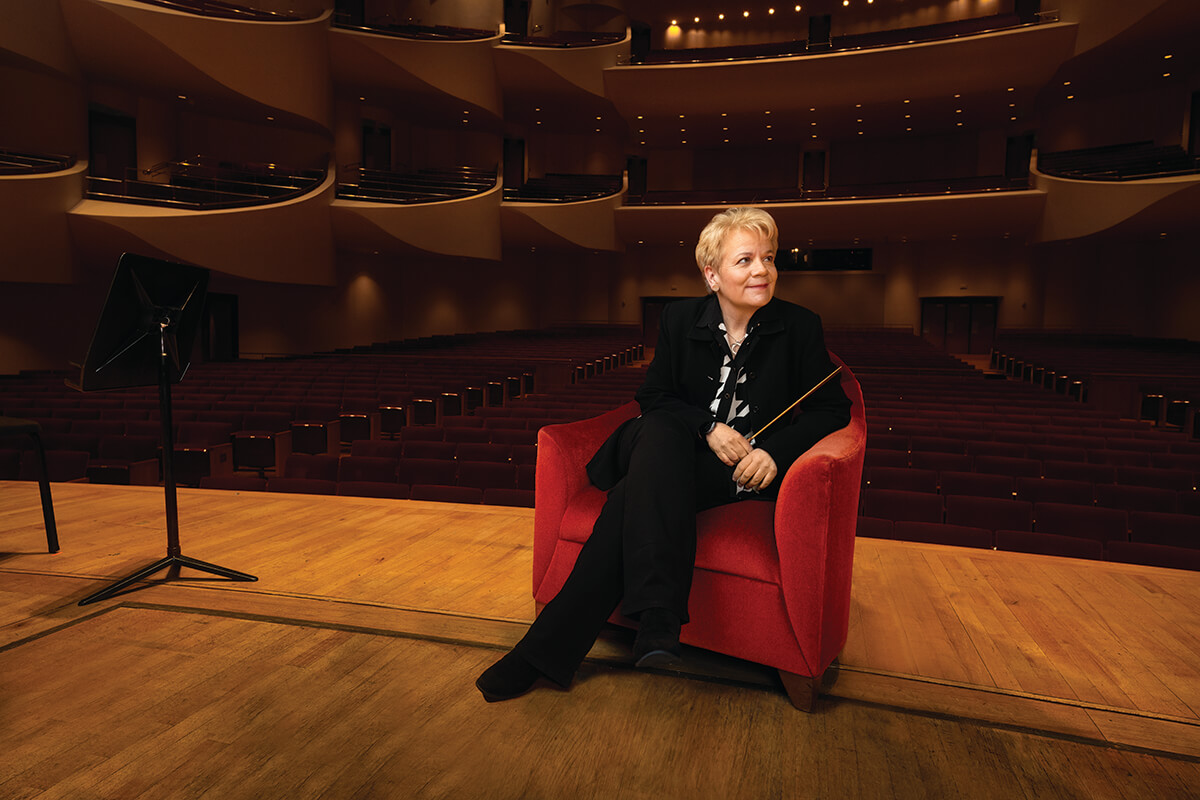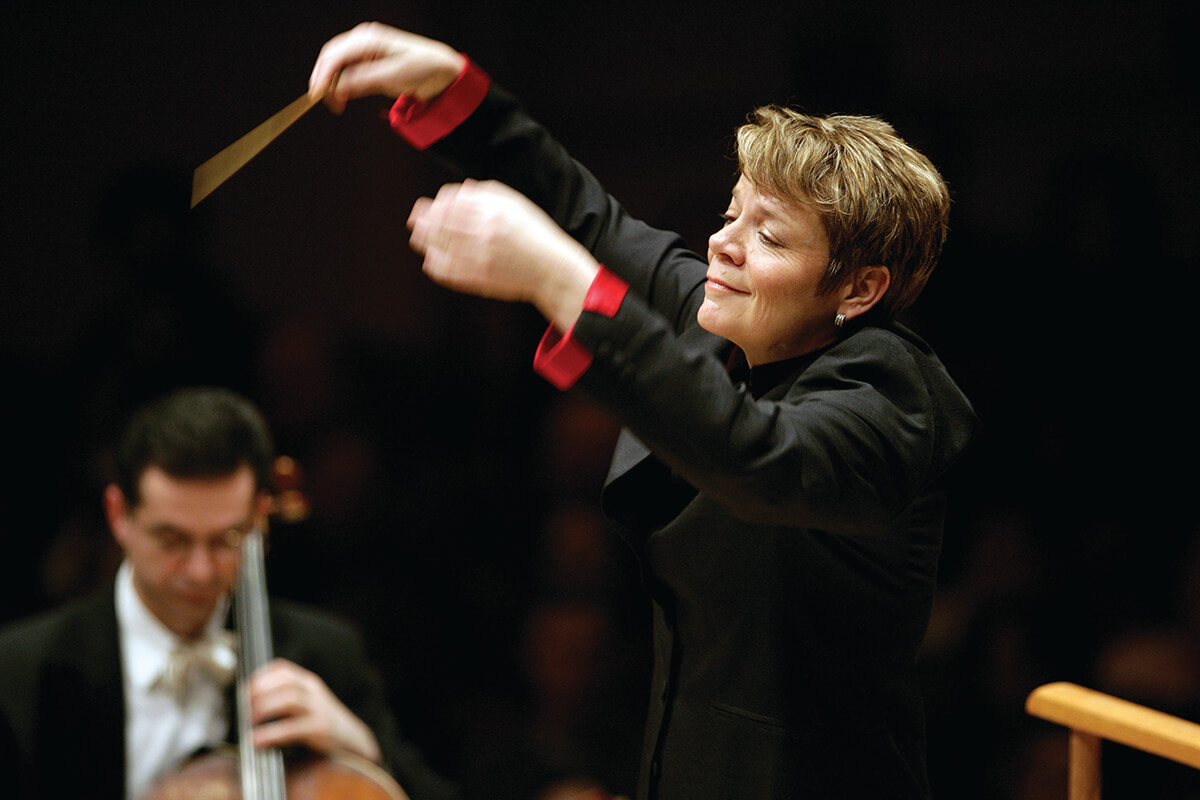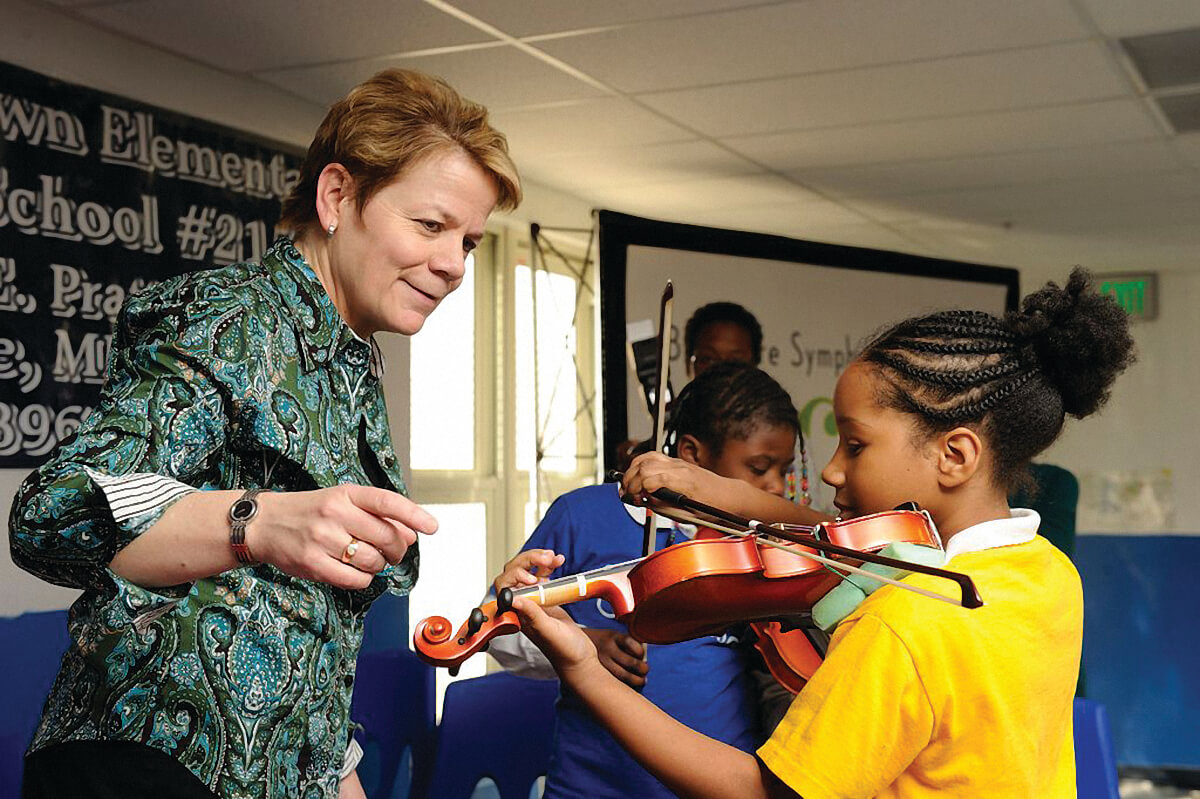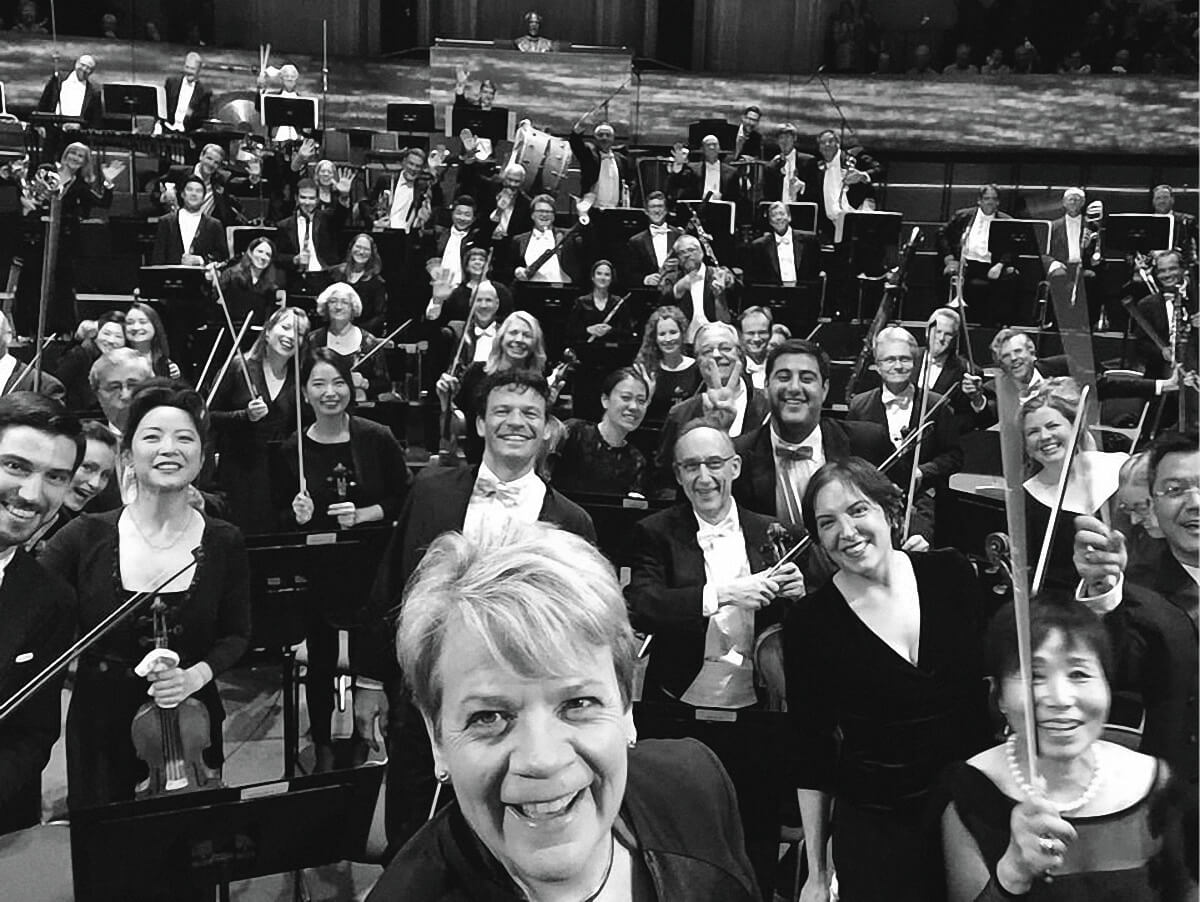Arts & Culture
Brava, Maestra!
Our exit interview with the BSO’s outgoing music director, Marin Alsop.

The word trailblazer is perhaps thrown around too casually, along with the word genius. Both, however, apply to Maestra Marin Alsop, the history-making outgoing music director of the Baltimore Symphony Orchestra.
During the course of her 14-year-tenure with the BSO, she became something of an international celebrity—a highly sought-after guest conductor, festival curator, and pedagogue—as well as a role model to aspiring female leaders everywhere. While she is technically continuing a relationship with the BSO as Music Director Laureate and OrchKids Founder, she will be focusing on her many other endeavors—in particular, her role as Chief Conductor of the Vienna Radio Symphony Orchestra in Austria.
Alsop’s years with the BSO were marked by soaring highs—a celebrated discography (14 of them), a prestigious world tour, community outreach programs that integrated the symphony with its city in unprecedented ways—as well as some undeniable lows: labor disputes, financial problems, and a few infamous clashes among the musicians.
Indeed, even Alsop’s arrival was not without controversy. While most of the world was celebrating her historic appointment in 2007—she was (and remains) the only female conductor to lead a major U.S. orchestra—many members of the orchestra groused about it, feeling they weren’t suitably consulted over her hiring.
In classic Alsop style, she confronted the players head on, saying, essentially: Do you want me here or not? Thank goodness for Baltimore, they wanted her. Almost a decade and a half later, she is leaving the orchestra—and the city of Baltimore—better than she found it.
You’re leaving the BSO after 14 years. How are you feeling about that?
I guess I shouldn’t say I feel great, but I feel great about it. I feel like I accomplished most of what I wanted to. I did as good a job as I think I could have. It was a really long run, and we saw lots of ups and downs. I’m super excited about what I’m doing now [with Vienna Radio Symphony]. It’s nice to have a change in life and open a new chapter and explore some new things. And I’m especially happy that I will continue a relationship with the orchestra for many years to come. That is something that hasn’t traditionally happened with exiting music directors at the Baltimore Symphony.
You’re 64. It’s great that in your line of work you can keep getting opportunities like this.
Yeah, but that said, you don’t see a lot of old ladies on the podium throughout the world, so there’s still a little bit of room to go. That’s one of my new missions—to talk about aging for women and the perception in society. But I have to say that moving my focus more to Europe has been really fun, and I’m really enjoying my time in Vienna. I think the United States is very entrenched in certain images of women. It’s very, very hard to change that perception. And I’m not saying that Europe is the mecca of open-mindedness, but they’ve been extraordinarily welcoming to me.

Of course, you had a hand in changing the perception of female conductors around the world.
I hope so, yeah. I think the #MeToo movement really kicked it into gear. Without that, I don’t think we would have seen the dramatic changes we’ve seen in the last few years. It’s only been the last five years that orchestras have been open to inviting women to guest conduct, women from a variety of backgrounds. There have been incredibly talented women and people of color around for centuries, but they simply were not given a chance. Because they were consciously kept out. The organizations and institutions haven’t been open to them—until now. Suddenly everything is really transformed because of #MeToo and Black Lives Matter. Finally. It’s great.
You’ve been pushing for this sort of thing for years.
A couple of years ago, I did a whole manifesto for the BSO about diversity and inclusion, but it [never happened]. Maybe everything is catching up to itself now.
You’ve always been ahead of the curve.
[Laughs wryly] There’s a certain amount ahead of the curve that is a great amount. And then there’s a further amount ahead of the curve that is not helpful. I’m always way too far ahead of the curve! I think the classical music industry is so conservative. They start to do something one way and then they do it that way for a hundred years.
“YOU DON’T SEE A LOT OF OLD LADIES ON THE PODIUM THROUGHOUT THE WORLD.”
One thing I admire about you: As a woman, you’ve encountered doubters in your career, but you’ve never let them define you. You set out to prove people wrong.
I think when people say you can’t do something, there’s part of you that gets crushed by that, for sure. And you start to have self-doubt. But I think the much bigger part of me gets really mad. Because it’s not fair. I think inequity and injustice are the biggest motivators. If I don’t stand up for justice, people who don’t have the same stubborn qualities, the same thick skin, they’re really going to get hit hard. I feel like that’s my job. I’m going to stand in front of them.
By the time this story comes out, you’ll have given the commencement speech at Juilliard. What do you plan to say to the students?
That it’s probably the most important graduating class in their entire history [because of the social and cultural changes that are going on]. They stand at the crossroads of what art is going to be moving forward. What kind of relationship is society going to have to art and art to society? What kind of responsibility does art have to society? It’s going to be up to these young people to really carry that mantle forward, to make some kind of cohesive statement.

After 14 years, what accomplishment at the BSO are you most proud of?
I would say the artistic quality of the orchestra. I think the orchestra now plays at a comparable level to the leading orchestras of the world. Technically, musically, in terms of sound palette and colors, I think the orchestra is right up there.
Next would probably be the discography that I leave them with. They’re all of extraordinary high quality. So that’s a nice legacy to leave. We’ve done some wonderful commissions. Tried to really diversify the repertoire. Bring in new composers. Feature Baltimore composers like Chris Rouse or regional composers like James Lee [III]. Celebrate creativity from the region.
And then, I’d say, the initiatives I was able to start. OrchKids, of course. And the Rusty Musicians program. And the BSO-Peabody Conducting Fellowship program. All of these things have brought a different dimension of access and inclusion to the table.
OrchKids is such a legacy. You changed lives.
The program did. I hope I contributed a little bit. The fact that [the students] see me as somebody from the neighborhood—Miss Marin: “Oh, if she can do it, I can do it.” I like that. I like that they’re so comfortable at the concert hall. They’re so comfortable listening to concerts. They’re so comfortable in front of people. The program has given them not just musical skills but also social poise. They’re really capable kids now. They can get out there and be leaders in the community. I think that’s great.
Famously, the orchestra took to the streets to perform during the Freddie Gray Uprising. What was that moment like?
It’s very important to me that you understand the impetus for that. That came from the musicians, not from me. And it was Michael Lisicky, the second oboe, who really spearheaded the idea of just stepping into the street and playing as a response. I called him and said, “Hey, if you need a conductor let me know. I’ll happily join you.” I was just a tagalong. I wish that, in that moment, we could’ve moved things forward more. To me, it was lost time between Freddie Gray and losing George Floyd.
What are some of your regrets about your tenure?
I would’ve really loved to have gotten the musicians integrated into the OrchKids program in a more meaningful way—built an ecosystem that included that program. I hope in the future that the orchestra will consider apprenticeships for the super-talented kids in OrchKids. Like, a junior apprenticeship for the top five, ten kids to come and play in rehearsals, to be mentored by some of the musicians. It could also change the complexion of the orchestra on stage, the demographics. Wouldn’t that be amazing?
Another thing I would’ve liked to accomplish, something I’ve been talking about for 10 years, is an urban redevelopment project centered on the Meyerhoff that would create a kind of arts place, an arts destination, not just for music but also for the visual arts, involving MICA, involving The Lyric. There are just so many resources. Center Stage is close by. My vision was to try to create a destination that had retail and residential and lots of creativity. Maybe a community arts center. People from the community could come and bring their kids and do things.
I mean, that’s a big lift and a big dream. But there are so many incredible creative resources in Baltimore, right? To try to connect them all up in some meaningful way would be so powerful. One of the problems is that the rest of the United States doesn’t recognize what we have in Baltimore. We haven’t been able to get together to promote it enough.
“I THINK INJUSTICE AND INEQUITY ARE THE BIGGEST MOTIVATORS.”
The BSO was more integrated in the community than ever before. Did you feel a responsibility to open the often rarefied world of classical music up to the people of Baltimore?
I did. And I do. I feel that’s part of the responsibility of being a leader. You create as much opportunity for as many people from as many varied backgrounds as possible. I think art is owned by people. I don’t think art is owned by the privileged. That’s wrong. And I really believe in access and inclusion. That’s my biggest passion.

I felt like Baltimore audiences formed a real love affair with the orchestra—and you in particular.
Yeah, Baltimore audiences are awesome. They’re rowdy. It’s the only classical concert I do where people are whistling and catcalling. I’m like, bring it on, people! And the audiences have done so much. And our supporters and donors have done so much. I can’t thank them enough, really. The musicians are rock stars in Baltimore. That’s a really important part of the equation.
Now that you’re stepping down, will you watch the BSO from afar like it’s your child?
No, it’s more like being the grandparent. You can enjoy the kids. But you get to go home. I’m already feeling that. When the arguing starts or the, you know, the consternation or the divisiveness, I’m like, “Okay, see ya!” And that is a really nice place to be.
All the good stuff, none of the hassle.
Exactly. I think that’s what being a grandparent is supposed to be about.
What will you miss most about Baltimore?
Well, I’m not leaving Baltimore. I teach at Peabody, and I adore my position there. We love our house [in Roland Park]. For me, besides the orchestra, of course, whom I adore, I really love the people of Baltimore. When I’m away that’s what I miss most. I had a great run. And I’m not really going. I’ll still be around.